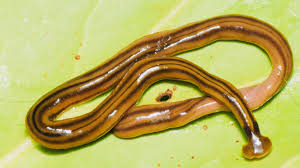Scientists in France have issued warning that some seriously creepy-looking predatory worms have squirmed their way into the country.
The strange creatures, called hammerhead flatworms, look almost alien, and they most certainly aren’t native to France. The worms are native to Asia, and the hungry little critters are known to prey on more docile earthworms.
Amazingly, it wasn’t scientists who first stumbled upon the invasion, but a French gardener. The man, named Pierre Gros, is cited as an “amateur naturalist” by the Washington Post, so he obviously knows a thing or two about species distribution, and when he dug up one of the giant worms in his own yard he knew it didn’t belong.
Gros contacted Jean-Lou Justine, a professor from the National Museum of Natural History in Paris, to get a second opinion. Justine was confused, thinking he was being pranked, but when Gros sent additional pictures of different species of the predatory worms he had dug up it was clear that something wasn’t right.
As it turns out, French gardeners were all too familiar with the hammerhead worms, and when Justine asked for pictures of the worms being dug up all around France he was buried in over a hundred photographs and videos.
So how exactly did this invasion go undetected by scientists for so long? Justine has no idea. “It is France! It is supposed to be a developed country. We have a lot of scientists, we have universities everywhere,” he says. “We have scientific proof from citizen scientists that they are infesting gardens year after year after year.”
Thus far it doesn’t seem like the worms have done any terribly significant damage, but the fact that they prey upon the native earthworms makes them dangerous. It’s possible that over time the predatory nature of the worms could lead to a disruption in the soil ecology of the region, causing all kinds of much larger problems. What can be done about the invasion is still not very clear, but for now the researchers are just working on getting the word out.

 Football1 week ago
Football1 week ago
 Health & Fitness2 days ago
Health & Fitness2 days ago
 Comments and Issues1 week ago
Comments and Issues1 week ago
 Featured6 days ago
Featured6 days ago
 Education7 days ago
Education7 days ago
 Business7 days ago
Business7 days ago
 Business6 days ago
Business6 days ago
 Crime7 days ago
Crime7 days ago

